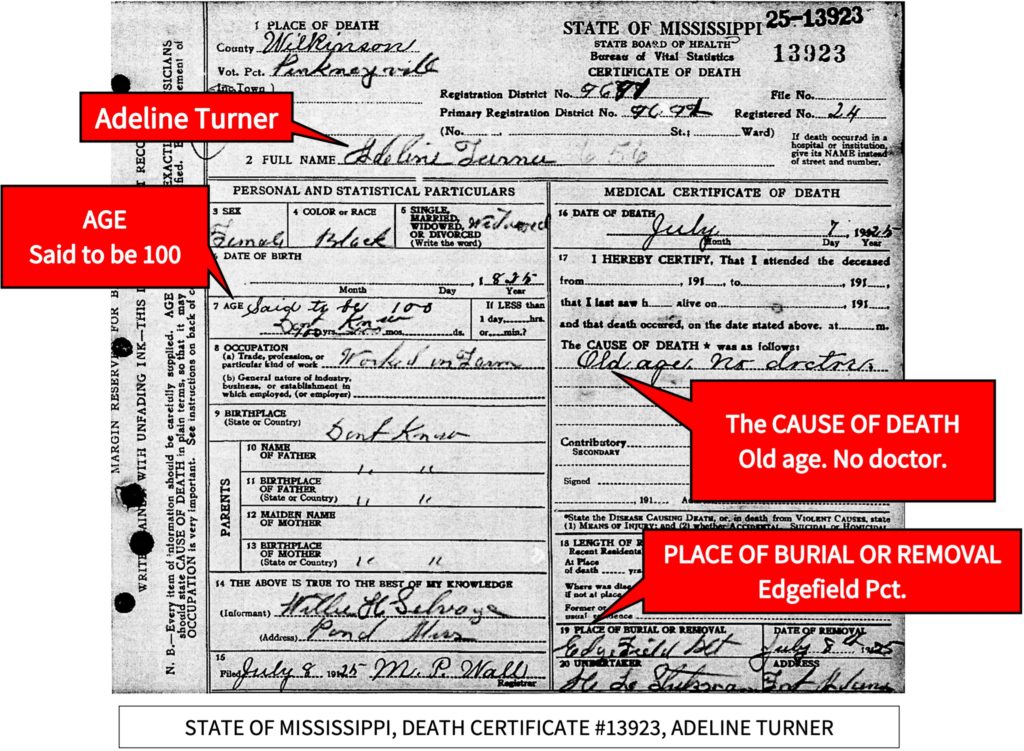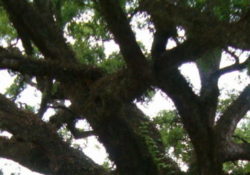My great-great grandmother Adeline Douglas Turner was born around 1815 and died July 7, 1925, in Woodville, Mississippi. She and her husband, Nelson Turner, were brought from Richmond, Virginia, into Woodville in around 1850 before the birth of their daughter Anna. Their children born in Woodville were Anna, Zacharia, twins Melvina & Amanda, Celeste, Robert, William, and Letty.
I don’t know the origins of her middle or maiden name – Douglas, but her full name Adeline Douglas Turner was remembered by family historians. I have never heard any stories about the life of my great-great grandfather Nelson Turner, who likely died in 1869, after the birth of his youngest daughter Letty. His name does not appear on the 1870 census or in any documents that I have found.

I had the honor and privilege of interviewing and recording 2 family members who knew Adeline Turner. As I have stated in earlier blogs, I interviewed her 94-year-old great-grandson Samuel Booker Minor, whose grandfather Pharoah Minor married Adeline’s oldest daughter Anna.
Samuel Booker Minor (1904-2001)
“They brought Grandma Adeline, I mean, that was my great grandmama, her name was Adeline…. She lived until I was 21 years old. She left her first 4 children in Africa, or, either in Virginia. They didn’t buy them. See you could buy the daddy and mama and not buy the children, or else you could buy the children and not buy the [daddy and mama].
Well, them old people, Dr. Patrick and them, his daddy was the one that buys the slaves. They got free under Dr. [Robert] Patrick. His daddy was Jesse Patrick, and he the one bought the slaves. He come from Virginia, and that’s where they captured them in Virginia.”
[Alvin Blakes interview with Samuel Booker Minor, December 26, 1998]
I interviewed Celeste Blakes Stirgus at her home in Baton Rouge, Louisiana, in late December 2000. She was the granddaughter of Adeline Turner’s daughter Celeste Turner Blakes, my great-grandmother. During the interview, which was a family discussion with 3 of her daughters and 2 of my cousins, she often said she did not have a good memory of her early life, but, to my delight, she was full of laughter and wit, and she answered most of my questions about Adeline Turner. She died in Baton Rouge on February 1, 2001, a month after the interview, 2 weeks before her 100th birthday celebration.
Celeste Blakes Stirgus (1901-2001)
“Yea I remember her. I was at her funeral. She was living with her daughter, she was living with old lady Anna, Anna Minor. She was living with her when she died. But now, how old she was, you know, if you don’t ever talk and have no record or nothing like that it gets away from you. They dug the grave and a strong rain came, they had to cover that grave over with planks to keep some of that water out. They had to get the water out of the grave to bury her. I was at her funeral.
They was together [Nelson and Adeline] – they sold them together. They left 2 daughters in Virginia. She never seen them no more… He [Nelson] must have died before my time… They left 2 daughters… 2 children, 2 girls she left behind during slavery times and they brought her to this country.
Old man Dr. Patrick he brought them to this country. They was selling them like cows…Dr. Patrick had her as a nurse. But she couldn’t wait on no black people. He brought her as a nurse. He had her as a nurse just for the whites… I went there once looking for the place, you know, the place that they was brought from. I’ve been to Virginia. But I never did find out nothing.
I don’t think she talked exactly like we talked. She had a little bit of an accent. But she could understand what you was saying… I remember her well. She had long, long, hair – hair bright, bright, white. She would get up every morning, her hair was long and white, and she would put it in a big ball [on top of her head].
I wasn’t there in slavery, but I reckon I was next to it. I know a lot about it you know.”
[Alvin Blakes interview with Celeste Stirgus, December 2000)

The story of Adeline Douglas Turner is one of the well-known stories passed down through the years in the Edgefield community. She is elevated and remembered through 2 elder family members who knew her, lived in the same community with her, talked to and listened to her, and cared for her. They remembered her story of how she was sold away from her children, shipped on a 3-to-4-week boat ride from a tobacco farm in Richmond, Virginia, to Edgefield Plantation in Woodville, to be a “nursemaid” for the children of the slaveowner. She and her husband, Nelson Turner, had 8 more children once they arrived in Mississippi, and for the rest of her long life she carried the burden of having to leave her 2 daughters behind in Virginia. After the death of her husband in around 1869, she became one of the revered elders of the Edgefield community and lived 58 more years until her death in 1925.
In many ways the life of Adeline Douglas Turner paints a picture of a time of great sorrow, loss, and trauma. Her story mirrors the journey that many of our enslaved African ancestors endured during their forced migration from Virginia to Mississippi. Thanks to the long-long memory of the Edgefield elders, her descendants now know her story so that she will always be remembered.


This article was enlightening and awakened my feelings, knowing she left two children behind in Virginia. Slavery is America’s shameful past that separated African American families for centuries. Alvin Blakes, I would like to give you a big shoutout and keep up the excellent work. Merry Christmas and a Happy New Year.
Thanks Marlene.
Thank you so much for this information, I am still trying to find my mom lineage .The Clayton’s,Charlie Young Sr & Josephine Lane & Roosevelt Clayton
Thanks Linda.
Fascinating narratives as usual my brother. It is so wonderful that you’ve been able to interview family members to learn all this history.
Thanks Vicki. I have had these tapes of my Elders for over 20 years. It took years to really understand the who/what/when & where they were talking about.
Hello Alvin,
This was such an emotional read. My mind took me on that voyage with the Turner-Douglas couple from Africa to Virginia. Thank you for sharing their story.
Thanks for reading Vernita.
This story presents a clear situation of why Afrikan descent people born and living up north should not hold their persons to be some kind of mo better than usen down here in the Deep South because both Ancestors were enslaved in the upper old south and many were separated and forced sold or brought down south to the land of the Red Nation. And for one part that’s why there are Afrikan Americans in Alabama, Tennessee, Arkansas, Louisiana, Mississippi and Texas today! On another part it was the American professional chattel Slavery Trafficking that forced brought the greatest numbers of enslaves in captivity from the upper old south down to the lower south.
Then there was the Atlantic enslavement trafficking that forced brought our Afrikan Ancestors and Foreparents to the upper old south, the 13 colonies and some directly to the lower Gulf south.
Asante Sana!
Thanks my brother. Forced and voluntary migrations are a part of our long history as a people.
Hello. Your research is excellent and well presented. Thank you for sharing this interesting information.
Hey Melvin. Thanks for reading.